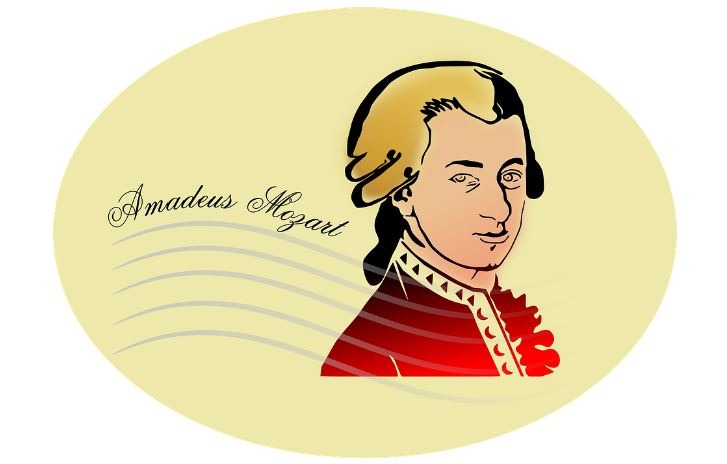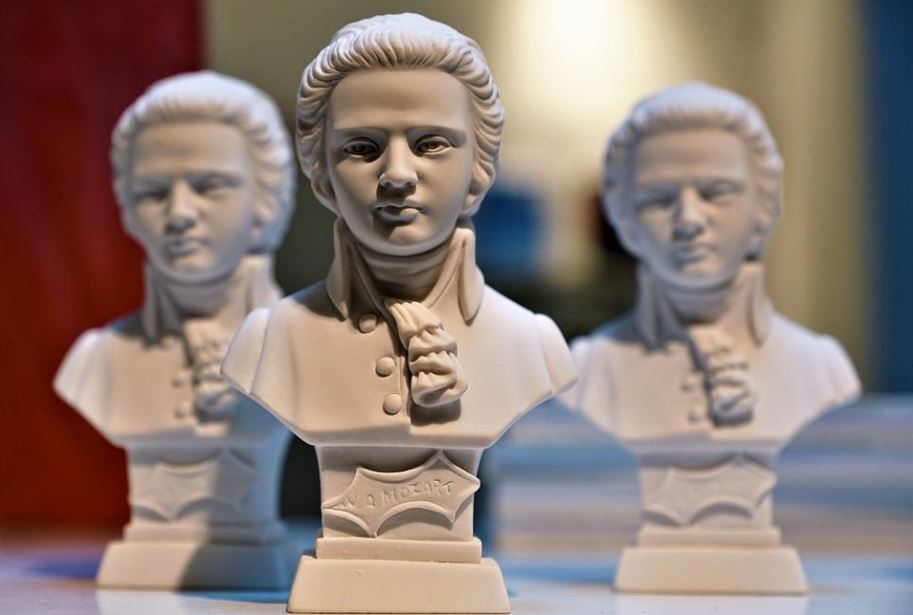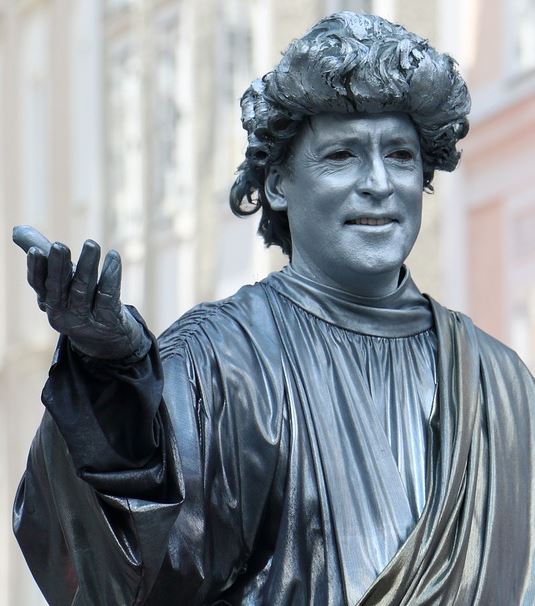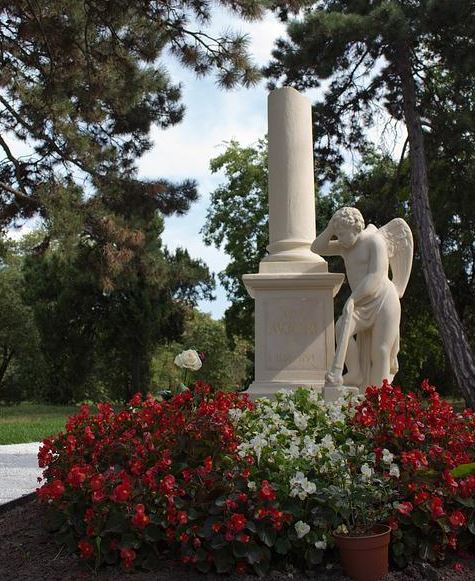Mozart’s full name was Johann Chrysostom Wolfgang Amadeus Mozart, and his baptism name was Johannes Chrysostomus Wolfgangus Theophilus Mozart. However, most people know him as Wolfgang Amadeus Mozart or just Mozart.
Mozart is known as one of the best music composers in history. His name is right up there with the musical greats like Beethoven, Chopin, Tchaikovsky, and so on. While Mozart was a very prolific composer in the Classical period, he unfortunately had a very short life; he passed away at the young age of 35. However, he did have a very rapid pace in comparing music, with over 800 works to his name.
Another unique aspect of Mozart’s work was that he wrote in several different musical genres. Several compositions of his have been acknowledged as some of the best operatic, choral, symphonic, chamber, and concertante genres. Overall, his music gained great appreciation for its beauty, elegance, harmony, and rich texture.
Overall Influence
The influence of Mozart on the musical world is unparalleled. During his lifetime, he composed music that helped to bring the Viennese Classical School to its height of success. Not only did he write in every musical genre of that time, he proved excellence and talent in each one of them. He had a taste, form, and range that made him a universal composer. However, some may also say that he wrote such different types of music in order to cater to the different tastes of his specific audiences.
Early Life
Mozart was born on 27th January, 1756 in Salzburg, Mozart was a citizen of the Holy Roman Empire and of Austrian heritage. Even as a child, he soon gained competence on the violin and keyboard. At just five years old, he even had a performance with European royalty as the audience. His father also took him on a European grand tour. Mozart also visited Italy at least three times as a young boy. At the age of seventeen, he had a position as a Salzburg court musician, but wanted more. To this end, he traveled away from home to seek something better.
In 1781, Mozart lost his Salzburg position while on a visit to Vienna. He remained in the city, where his name did get famous but brought him limited earnings. While he was there, Mozart composed a large chunk of his most known concertos, operas, and symphonies. Perhaps he might also have been intrigued by the concept of the musical universe as put forward by Pythagoras.
Early Works
Mozart’s father actually hailed from a family that was known for its bookbinders and architects. The father, Leopald, was estranged from this family, and had authored a well-received manual on playing the violin. He published this in the year that Mozart was born.
Mozart’s mother was named Anna Maria Perti, and was from a missile-class family. The couple had seven children in total, but only two survived–Mozart himself and Maria Anna, his sister.
As a boy, it was clear that Mozart had a great musical talent. He was playing chords on instruments like the harpsichord at three years old; at four years old, he had mastered some short pieces. At the age of five, he had started composing his own pieces. Shorty has recorded several anecdotes about how he could precisely memorize any kind of pitch and composed a concerto at five years of age. Reports also say that he was both a gentle and sensitive soul; in fact, the trumpet scared him.
Before he turned six, he and his sister went to Munich with their father. The sister, nicknamed Nannerl, also had quite a bit of musical talent. The duo played in the Bavarian court, then went on to Vienna to perform at noble houses and the imperial court. Leopold would describe his son as “The miracle which God let be born in Salzburg ”–he believed it was his God-give duty to make this miracle famous in the world. At the same time, he wasn’t averse to gaining some profit out of this duty.
The brother and sister also went on a long European tour with their father, often playing and even improvising in public, in a court, or even churches. Leopald would send letters to his Salzburg friends and describe the admiration they drew from onlookers. Some of these letters have survived to this day.
It was on this tour, in Paris, that Mozart’s composition was published for the first time. These were sonatas that he dedicated to a princess, which were to be played on the violin and keyboard.
In London, they got to meet the youngest son of Johann Sebastian Bach. He was a leading figure in the musical scene of the city, and Mozart was influenced by him. During this time, Mozart composed symphonies for the first time.
Responding to Local Preferences
At the age of 13, Mozart was quite fluent in musical language. He was good at adapting his music to the local dialects. Some of his earliest sonatas composed in London and Paris show how he took pleasure in the various textures and notes. However, his symphonies at The Hague and London showed that he quickly and intuitively responded to the kinds of music he had experienced.
Ages 10 to 17: Growing Reputation
Mozart’s pre-teen and teenage years were mostly spent in working as a composer. His works had grown to a maturity that rivaled most older and more established musicians of the time. From 1766 to 1769, he remained at Salzburg and wrote instrumental works as well as school drama music in both Latin and German. His first actual opera was produced in 1768. While his fame and reputation was growing, there weren’t any suitable posts presented to him. His father intervened again and took Mozart to Italy again when the composer was just 14. After all, Italy was a center for the arts, with artistic greats like Leonardo da Vinci embedded in its history.
Italian Tours
In those days, if a composer wanted to have a successful and international career, they had to master the Italian operatic style. With the political dominion of Austria in northern Italy, the doors were easily opened to Mozart. His mother and sister don’t accompany him, but the correspondence between the family gives us details of the events.
The first Italian tour started in December 1769. Mozart’s work became popular in Italy; he received an opera commission in Milan. In Rome, he received membership into an honorary knightly order through the then-Pope. In Bologna, he gained a membership to the Accademia Filarmonica in spite of their rule that members had to be at least 20 years of age.
While traveling in Italy and occasionally returning to Salzburg in between, Mozart produced some of his first-ever settings of opera seria on a large scale. This means court orders that deal with serious subjects. He also began writing symphonies again.
Paris proved to be a bit difficult for Mozart here; after spending 9 months there, he returned to Salzburg again. He was depressed due to his lack of success and also by his mother’s death while he was in Paris. He started writing music to order, basing his various pieces for different instruments and genres. He also started giving lessons in order to make some more money.
The years Mozart spent in Vienna contained one of the most impressive musical developments in a very short period. From the age of 25 to 35, Mozart developed his music very quickly, way beyond the achievements of his contemporaries. The major works here brought together all of the fields he had covered previously as well as some new additions.
From 1781 to his death in 1791, Mozart’s achievements in composing opera are even more amazing. Perhaps this was that the problems presented in composing opera had much more range than the larger forms. His last opera was The Magic Flute in 1791. After this, Mozart started working on The Requiem, which was to be left unfinished due to his mysterious death.
Death and Legacy
The Requiem was to be a Mass that an unknown benefactor or financial supporter had commissioned. Apparently, Mozart didn’t know who this person was. He was also supposed to have become obsessed with the work, believing that he was writing it just for himself. The efforts he poured into this work led him to become ill, exhausted, and drained. While he did complete the first couple of movements and had the sketches for many more, the last three sections simply weren’t there at the time of his death.
After Mozart passed away, a pupil of his by the name of Franz Süssmayer completed his last work. Mozart’s death took place in Vienna, Austria, on the 5th of December, 1791.




